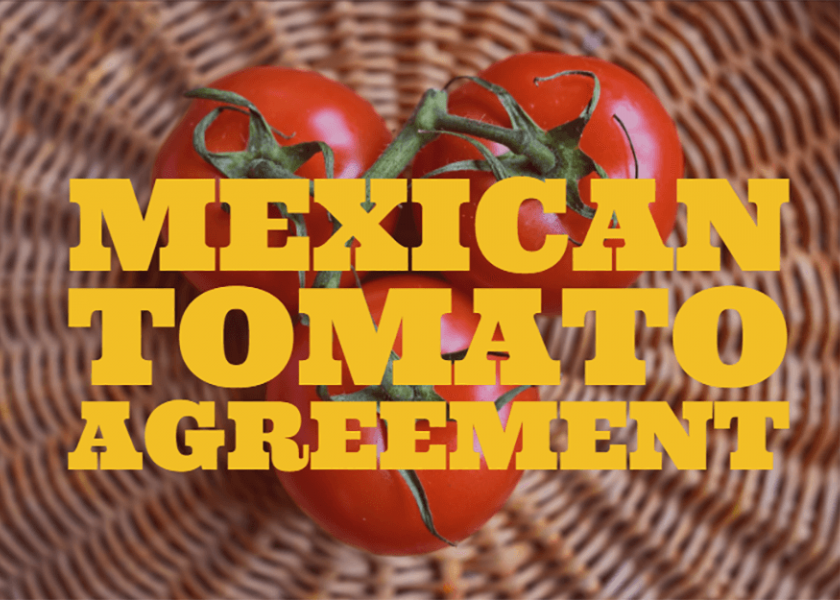Another battle in the tomato war

The battle over Mexican tomato prices has reared up again between warring grower groups.
On one side, it’s the Fresh Produce Association of the Americas, representing more than 120 U.S. companies that distribute, sell and transport of fresh fruits and vegetables grown in Mexico.
On the other side, it’s the Florida Tomato Exchange, representing companies that produce about 50% of the fresh-market tomatoes grown in the U.S. The Florida Fruit and Vegetable Association weighs in too.
This time, the battle is over who pays the shipping costs incurred after Mexican-grown tomatoes cross the border into the U.S., up to the point of sale.
The FPAA stated in a July 14 news release that the FTE is pushing the U.S. Department of Commerce to change the Free On Board, or FOB price rule, which would affect all produce businesses across the industry, raising prices that would then have to be passed onto the consumer.
“This amounts to a sudden, unwarranted re-interpretation of the latest nearly two-year-old 2019 Tomato Suspension Agreement. It would alter how sales have occurred under iterations of the Tomato Suspension Agreement going all the way back to 1996,” FPAA president Lance Jungmeyer said in the release.
But FTE said in a rebuttal statement that it’s not asking for a change to the 2019 agreement. It’s asking for the agreement to be enforced, and abiding by the rules won’t affect the rest of the industry or FOB prices at all.
The new reference price terms were specifically included by the Commerce Department in the 2019 agreement to provide for stronger enforcement, according to FTE’s rebuttal. The 2019 agreement — in conformity with the antidumping statute — allows all expenses incurred in Mexico to be included in the reference price but requires that all expenses incurred on the U.S. side of the border to be added on to the reference price.
“The FTE is not seeking a renegotiation or change to the 2019 agreement. We simply want the language and rules to be enforced as they were written and agreed to in 2019 by the Commerce Department and the Mexican tomato industry,” FTE executive vice president Michael Schadler said in the release. “Otherwise, this agreement will fail like all the others before it.”
At issue is enforcement of language in the 2019 Tomato Suspension Agreement, which aims to set price minimums, or reference prices, for imported tomatoes, to create fairness in trade and competition with domestic tomato growers.
The suspension agreement has evolved and is no longer stopping a dumping investigation because the International Trade Commission completed the investigation after all parties signed the latest agreement. There’s a provision in the dumping law that allows the petitioners, in this case, the domestic industry, to request completion of the underlying investigation after a suspension agreement is signed. That’s what FTE did in late 2019.
The trade commission ruled in domestic growers' favor, as reported in November 2019 by The Packer. This means that the suspension agreement is no longer suspending an investigation, but it’s now suspending a dumping order. If the agreement is terminated, the default would be dumping duties since the investigation has been completed and the domestic industry won the final determination at the ITC.
The agreement also specifies the ways the U.S. Department of Agriculture may inspect and enforce the rules on these tomato imports.
In the 2019 agreement’s section D: Shipping and Other Arrangements, it states:
All Reference Prices are FOB U.S. shipping point, i.e., to the U.S. side of the U.S.-Mexico border. The Reference Price includes all palletizing and cooling charges incurred prior to shipment from the Mexican shipping point, i.e., from the Mexican side of the U.S.-Mexico border. The delivered sales price to a Buyer for all Fresh Tomatoes from Mexico exported directly, or indirectly through a third country, to the United States shall include all movement and handling expenses beyond the point of entry into the United States (e.g., McAllen, Nogales, or Otay Mesa) and in excess of the Reference Price, i.e., the FOB U.S. shipping point price.
The point of contention seems to be the delivered sales price to a buyer, which can include expenses “beyond the point of entry into the United States,” and “in excess of the reference price, i.e., the FOB U.S. shipping point price.”
The group representing Mexican tomato growers said this move by Florida growers is politically motivated and wide-reaching in its effects, if granted.
“Instead of changing their own production methods to meet changing consumer demand, FTE reflexively blames imports and tries to game the system by demanding Commerce make an unprecedented rule change as to the meaning of FOB sales price,” Jungmeyer said in the release. “Commerce cannot move forward with FTE’s absurd demands or it threats to undermine FOB pricing norms for the entire produce industry.”
FTE stated the Mexican grower group is trying to inject fear into the whole industry, and that if they didn’t like the agreement terms, they shouldn’t have signed it in 2019.
The Florida Fruit and Vegetable Association said in a statement that even since the 2019 agreement, domestic produce growers are still suffering from unfairly imported produce.
“The 2019 Tomato Suspension Agreement is one solution to help level the playing field for the domestic tomato industry, but without strict enforcement of this existing U.S. trade law, American tomato growers will continue experiencing the devastating impacts of unfair trade.”







